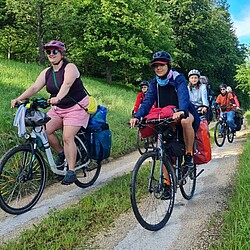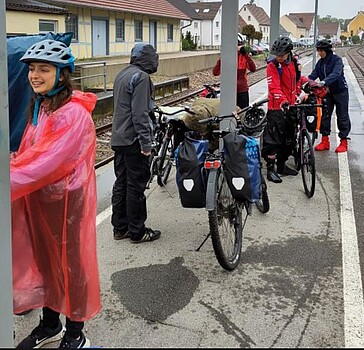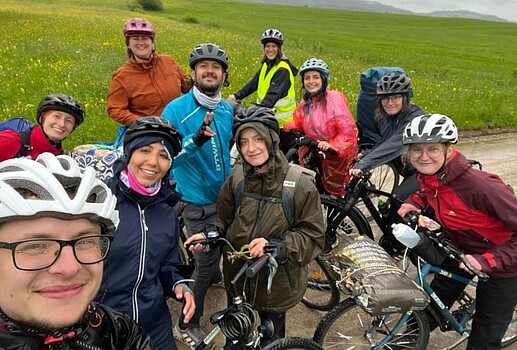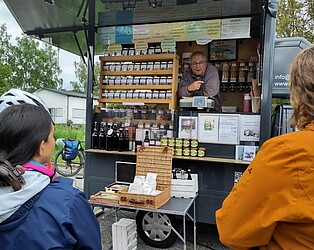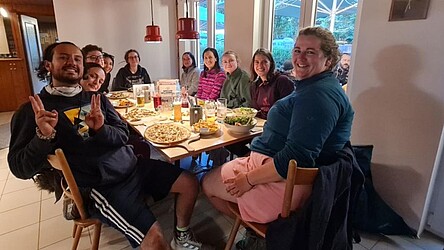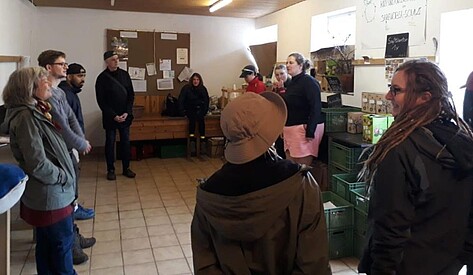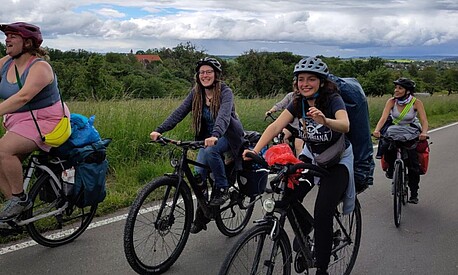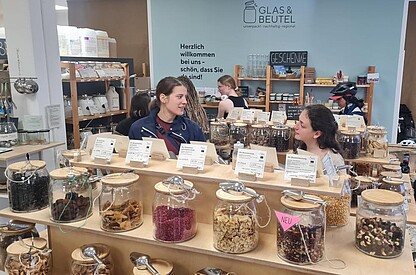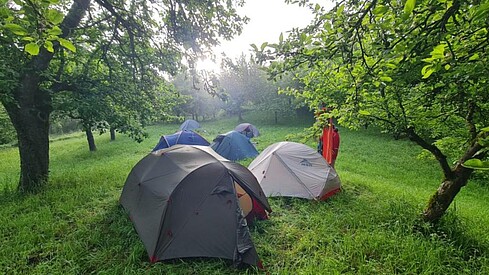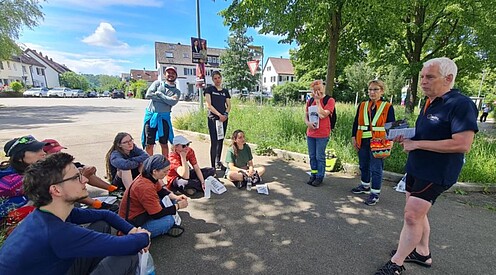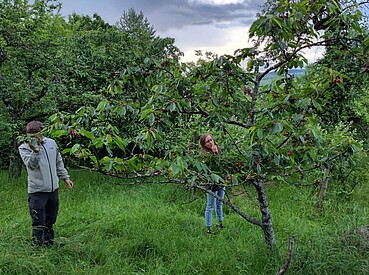Day 1
Our biking excursion began on May 21st at 8:05 AM from track 12 at Stuttgart's main station. I had been eagerly anticipating this trip, which was part of our module "Exploring Regional Transformation Through Utopias." The class had started a few weeks earlier, giving us time to prepare and learn about the different initiatives we would visit. While I had a general idea of what to expect, I was also excited to be surprised by the details. The prospect of biking, camping, and visiting various initiatives thrilled me. However, I was a bit anxious because I didn't have bicycle bags. Instead, I carried my tent, clothes, and sleeping bag in a tall hiker's backpack that I placed in a basket. This setup was quite unstable at first, especially since the basket wasn't securely fastened.
We caught the first train to Hechingen, where we transferred to another train to Burladingen. We were a group of seven students and three course leaders, making a total of ten people. It was fun attracting attention wherever we went, with many people smiling at us.
Upon arriving in Burladingen, we had a short 10-minute ride to our first stop. Although brief, this ride was enough to get us completely soaked as it was the rainiest day of our entire tour. Many of us were prepared for the wet weather; I had a raincoat and had covered my luggage with a large blue plastic bag, keeping everything dry except my shoes and pants. Despite the discomfort, this day toughened us up, making the subsequent days seem much easier in comparison. Typically, I avoid the slightest drizzle, but during the following days, my attitude changed completely. I thoroughly enjoyed the outdoor experience, the fresh air, and the physical activity, which gave me a lot of energy and a good sense of well-being.
Our first stop was the "Biohof Riehle/Binsenberg Hof," a farm focused on milk production with 75 dairy cows and their offspring. The Riehle family uses their farm for educational purposes, opening their gates to kindergartens, schools, and anyone interested in learning about farming. They aim for sustainability among other approaches by implementing agroforestry, a land-use management system that integrates trees with crops or pasture. As part of our coursework, we had to prepare a presentation on one of the transformative approaches we visited. The first presentation was on agroforestry. This gave us the opportunity to compare our theoretical knowledge with real live examples. After the presentation, we enjoyed a diverse, healthy lunch with food everyone had brought to share. This first visit was enlightening, though I wished for dry shoes. I also managed to secure my basket better with cable ties, making my load stable for the journey ahead.
We cycled around 20 km to our first campsite, stopping to admire some fields of flowers along the way. Two of our participants, who had extensive plant knowledge, shared interesting facts about the flora we encountered. Fortunately, the rain stopped as we reached the campsite, allowing us to set up our tents in dry conditions. For dinner, we cooked vegan Bolognese with local lentils and noodles on a camping stove, which was delicious. We prioritized buying local, organic, and healthy food throughout the excursion. After dinner, we reflected on our day before going to sleep.
Day 2
The second day started early at 6:15 AM. After breakfast, we packed up and began our 30 km ride to Wendelheim, part of Rottenburg beim Neckar. The ride offered beautiful panoramic views and highlighted Germany's scenic beauty, reminding me that we don't always need to travel far to see amazing places. Our first stop was "rebio," a Bioland producer association. We were welcomed with drinks and cookies and given an introduction to their work. Rebio aims to establish regional and sustainable marketing structures, involving 180 farms in southwest Baden-Württemberg and 40 employees, with a grain warehouse capable of storing 3,200 tons. It was fascinating to learn about the numerous steps and people involved between the farmer and the consumer, remembering me how disconnected we often are from our food sources.
Next, we visited a rebio member farmer, observing how lentils and oats are grown together and discussing the associated opportunities and challenges. After a quick lunch break (cut short by rain), we cycled back to Rottenburg for a short rest before heading to our next utopia: a mobile unpackaged store run by Horst Gruber. One day he decided to change his life and bought a van from which he sells unpacked, local products, emphasizing local sourcing even for unique items like Swabian-themed gummy bears.
We then cycled to Tübingen, where we set up camp and enjoyed dinner at a campsite restaurant. A delicious end to an exhausting but fulfilling day.
Day 3
The third day started more leisurely since we stayed two nights at the same campsite, so we did nothave to pack everything in the morning. After a 7 km ride, we arrived at the "Biolandhof Waldhausen"farm, which supplies CSA (Community-Supported Agriculture) Tübingen with a share of its harvest. Thesecond student presentation was on CSA (Community-Supported Agriculture), a system whereconsumers purchase "shares" of a farm's harvest in advance. Participants pay a subscription fee and,in return, receive regular deliveries of fresh produce directly from the farm. This model supportsfarmers by providing upfront capital and guarantees consumers a supply of locally grown, seasonalfood. Despite my familiarity with CSA from my involvement with CSA Mainz, it was great to see, howour food system can be handled differently. It is always good to remind ourselves that we do not haveto do "business as usual", to see that change is possible and that there are already existing, goodrunning approaches which are good for the people and the environment.
Our next stop was the Foodsharing Café Mehrretich, which operates on a pay-what-you-can model andpromotes sustainability by offering surplus food from local sources. The café, founded by volunteerslike Lisa Dann, fosters community and inclusivity, encouraging social interactions by offering a place fordifferent initiatives to meet or to carry out events. For me personally, meeting Lisa was truly inspiring.Lisa, a girl my age, studied in Tübingen and now has a regular job. In another universe, I could havebeen her. This demonstrates that anyone can make a difference. You just need to start; you don't needa lot of money or to be some kind of superhero. You can gather with others and simply begin.
Our final visit for the day was the 4-Häuser-Projekt (Miethäuser Syndikat), a cooperative housinginitiative that aims to secure affordable, self-managed housing. It supports the acquisition anddevelopment of residential properties by groups of tenants, preventing real estate speculation.Through a collective ownership model, buildings are legally protected from being sold on the market,ensuring long-term affordability and tenant control. This project fosters community-oriented living andsustainable housing solutions. Here, my classmate and I hold our presentation on Ecovillages,intentional communities designed to regenerate social and natural environments, integratingsustainability's four dimensions: ecology, economy, social, and cultural. Though different, the 4-Häuser-Projekt shared similarities with Ecovillages.
That night, one of the "4-Häuser-Projekt" houses hosted a concert, providing a fitting end to the day.
Day 4
On the fourth day, we packed up again and rode to the Café "Dona Sa," which offers specialty coffeeproduced by women in Brazil in small family businesses and purchased through direct trade. This visithighlighted the diverse aspects of sustainability, including fair trade and gender equality.
We then cycled to Nürtingen, stopping for lunch by a lake where we could relax and swim. In Nürtingen,we visited the unpackaged store "Glas und Beutel", which offers a wide range of unpackaged goods andaims to reduce waste and enliven the city center. It was amazing to see how many unpackaged goodsthey had, from soaps, to nuts, rice, noodles, sweets and even a chocolate spread.
After the "Glas und Beutel" store we visited the nearby Welthaus, an organization dedicated to globaljustice, sustainable development, and intercultural understanding. We spent our last night in a fruitorchard owned by the CSA we visited the day before.
Day 5
The final day involved a 30 km ride to Esslingen, where we met the ADFC-Esslingen (German CyclingClub) and learned about their work in promoting cycling on local and national level. They advocate fora better biking infrastructure, offer training and tours, and provide cycling accident insurance.
After a picnic, we visited the Transition Town Esslingen, a community-led initiative for sustainability. Transition Towns encourage practical projects and grassroots solutions to build a more sustainable, self-sufficient, and connected community. To achieve this, they are organized into different working groups.
Our final stop of the excursion was the "Kleine Wildnis Stuttgart," an urban nature project transforming unused spaces into biodiverse wilderness areas. It promotes urban biodiversity, environmental education and community engagement. By creating and maintaining these natural habitats, the project provides a refuge for local wildlife, enhances ecological awareness among residents, and offers a green space for relaxation and learning. We ended the excursion with a BBQ at this beautiful place, celebrating our incredible journey.
Throughout the week, I gained new knowledge, great experiences, and wonderful memories. Most importantly, I felt inspired to start making changes myself, with the aim of contributing to a more sustainable future. Sometimes we get the impression that everything is going in the wrong direction.Seeing all these great initiatives was encouraging; a sustainable world is possible, we just need to start.

